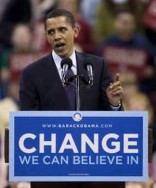Latest Gear Live Videos
Werd: Bailout - Part One

Posted by Patrick Snajder Categories: Domestic Policy, Editorials, Media, Taxes, US Economy, Wall Street,

In honor of Merriam-Webster’s 2008 word of the year, bailout, we will focus this week’s efforts of The Werd on the big story of the year.
To start the discussion, I will suggest these two great charts:
A Visual Guide to the Financial Crisis - Part One
A Visual Guide to the Financial Crisis - Part Two
Part One explains the many reasons for the financial crisis; Part Two suggests an alternative bailout that punishes those who benefitted from the bubbles without extracting social funds already marked for public programs such as social security or retirement funds (as the current bailouts do). This expert work shows how solutions to our problems are not beyond our ability, but merely beyond the imagination of our current leadership.
We’ll dig in on Tuesday with my precious take.
BAILOUT SERIES
Bailout - Part One
Bailout - Part Two
Bailout - Part Three
Bailout - Part Four
Bailout - Part Five
Read More  | Merriam-Webster's 2008 Word of the Year
| Merriam-Webster's 2008 Word of the Year
Advertisement

This week’s werd pirate, as told by the other OED:
pirate (n.)
1254, from O.Fr. pirate, from L. pirata “sailor, sea robber,” from Gk. peirates “brigand, pirate,” lit. “one who attacks,” from peiran “to attack, make a hostile attempt on, try,” from peira “trial, an attempt, attack,” from PIE base *per- “try” (cf. L. peritus “experienced,” periculum “trial, experiment, risk, danger,” see peril). Meaning “one who takes another’s work without permission” first recorded 1701; sense of “unlicensed radio broadcaster” is from 1913. The verb is first recorded 1574.
From its earliest roots, we can see that the word is based on the seafaring attack definition that we know very well and “one who attacks.” Then, in 1701, that very concrete definition gains an abstraction – it becomes the piracy of copyright, a taking of thought. You can say that 1701 marks the death of the singular pirate and welcomes a broader definition founded in the world of Gutenberg’s movable type.
We should not find it ironic, then, that Captain William Kidd was executed in 1701 for his act of piracy.
Click to continue reading Werd: Pirate - Part Five

So in case some of you didn’t get the subtle satire, Part Three of this week’s Werd said that pirates can’t exist without capitalists. If we want capitalism, we should expect pirates; if we want to rid ourselves of pirates, all of the laws and security in the world won’t ever get rid of them, so long as we still cling to capitalism.
Today I received my copy of the January issue of Harper’s Magazine. The very first entry I read is by former Editor-in-Chief Lewis H. Lapham, who writes about the financial crisis, etc. Spurred by Thomas Friedman’s myopic quote that says Americans need to get back to their roots and “thinking about how—not just how much,” Lapham notes that the foundation of America’s independence from Britain was largely due to America’s embrace of privateers, who attacked British merchant ships and sold the profits of the booty to the French to support the revolution. Loathe as I am to include huge block quotes of pirated text, I can’t help but reprint part of Lapham’s opening editorial that relates directly to this week’s Werd and essentially proves the subtle slants of arguments about pirates that I have been setting up all week.[1] Lapham, better than I, writes my perfect and fitting conclusion. Here we go…:
Click to continue reading Werd: Pirate - Part Four
Read More  | Harper's Magazine
| Harper's Magazine
Werd: Pirate - Part Three

Posted by Patrick Snajder Categories: Business, Editorials, Humor, US Economy, Wall Street,

Where, precisely, is the line crossed that separates Robin Hood, the hero to the lower class, from Robin Hood, terrorist?
As usual, it seems to be a matter of perspective. If you were sending gilded coins to your dear mother by way of carriage to pay for her The Plague medicine and Robin Hood up and stole your ducats, surely you would see Hood as the terrorist. Even if the money Hood swiped was going to pay for the conspiracy to infect the lower class with The Plague, chances are that the sender would want Hood’s head on a platter. I guess the overriding feeling is that if people take things that belong to you, you tend to want revenge or at least want to call them a thief, hoping that they will be prosecuted so you can get back the money that rightfully belongs to you.
But, if you are struggling to make ends meet as a cobbler and you can’t afford your child’s The Plague medicine, then when Hood arrives at your door with a burlap sack full of free money, surely you would sing his graces. Thanks to the beneficence of your green-suited savior, little Sally will live to see another day. So what if some highfalutin dingleberry lost the spending money for his elaborate vacation? Is his happiness more important than little Sally’s health? From the viewpoint of the cobbler’s eye: Hood is a hero.
All of us have either found ourselves in moments of Hood-worship or Hood-hate. If we follow the genealogy of the dollar bills in our own accounts, surely we will find some dollars buried in our past that have known thievery and charity. Some times our lives are subsidized for our benefit and some times we subsidize others for their benefit.
Click to continue reading Werd: Pirate - Part Three
Read More  | Ladhe burns his bridges
| Ladhe burns his bridges
The Bush Legacy

Posted by Charles Mitri Categories: Business, Domestic Policy, Editorials, Foreign Policy, Foreign Relations, History, US Economy, Wall Street, War,

When George W. Bush vacates the White House on January 20, 2009, the floodgates will open, as political pundits line up to take pot shots at his eight years as Chief Executive.
Presidential rankings are nothing new. Every former president has one and have eschewed the usual practice of getting an objective view of a president’s legacy after leaving office. These days, the Internet and instant readers’ polls have made the tried and true method of waiting a few years for a ranking virtually obsolete.
Down to business. America’s best presidents are a very elite group, usually judged by how well they react during a crisis. At the top of the heap there are Lincoln, FDR, Washington, Jefferson, Teddy Roosevelt and Woodrow Wilson. Over the last few years there’s been a shift in rankings at the bottom of the barrel. Grant and Harding used to occupy the number one and two slots. Over recent years, James Buchanan has assumed the bottom spot with Herbert Hoover right on his heels. Buchanan gets the blame for the Civil War. Hoover is charged with the 1929 stock market crash and onset of the Great Depression two years later.
Click to continue reading The Bush Legacy
Barack Obama’s First Hundred Days

Posted by Charles Mitri Categories: Domestic Policy, Editorials, Education, Foreign Policy, Foreign Relations, Taxes, US Economy, Wall Street, War,

So… January 20, 2009, history takes its latest bow when President-Elect Barack Obama is sworn in as America’s 44th Chief Executive. The fortunate ones lucky enough to secure Inauguration tickets will brave arctic temperatures as the rest of America watches this latest chapter in US history unfold on an ocean of televisions from Seattle to the Florida Keys.
January 21, 2009 will mark the real onset of what might be called the Altering Era. That’s the day the President-Elect enters the Oval Office and starts work on a world of problems. What follows is a best guess at what to expect from Barack’s first hundred days in office.
Click to continue reading Barack Obama’s First Hundred Days
I Thought It Was Patriotic
Posted by Sal Traina Categories: Domestic Policy, Editorials, Elections, US Economy,

All of these people telling me to support my President, and rally behind him is starting to agitate me. Yes. Barack Obama is my new President, and I will support him, and I do hope he’s successful, but, the same people telling me I should do so are the same people who say “it’s Patriotic to question, and disagree with your President.”
They are the same people who said, “George Bush is NOT my President.” I’ve heard this crap the past four years by Democrats like Hillary Clinton, Barack Obama, Harry Reid, Nancy Pelosi, Maxine Waters, Dick Durbin, Babara Boxer, Howard Dean, John Kerry, Ted Kennedy, Al Gore, and many others.
Click to continue reading I Thought It Was Patriotic
It doesn’t matter that nearly 50% of our home electric comes from coal. The predicted winner of today’s Presidential Election, Democrat Barack Obama, wants to punish coal companies, and other industrial markets, with Cap and Trade. This will slow, or maybe even reverse economic progress in the United States. The predicted loser, Republican John McCain, also supports cap and trade, but not to the extent Obama does. Either way, cap and trade never worked.
Click to continue reading Coal Industry To Be Bankrupted
Wealth Distribution = Socialism
Posted by Sal Traina Categories: Editorials, Elections, Media, Taxes, US Economy, Videos,
Socialism, since it’s birth, has been centered around the idea of more government control and distribution of wealth, or “spreading the wealth around,” as Democratic Presidential Nominee Barack Obama likes to say. What I like to say is, you can put lipstick on socialism, but it’s still socialism.
How do people believe his campaign’s spin on Obama’s own words that he wants to “spread the wealth?” I can’t believe that with only eight days left until the election, this 2001 Barack Obama interview is only now starting to make it’s way around the internet and other outlets.(not the mainstream media…of course).
Click to continue reading Wealth Distribution = Socialism
Read More  | The Wall Street Journal
| The Wall Street Journal
 The Great Depression was brought about as a result of monetary inflation (68%) from 1921-1928. (See: What is the Federal Reserve Doing?) There were other factors involved, but this was the primary factor. This was mostly the result of “easy credit” (a recurring theme isn’t it?). Credit expansion, as we have seen again, leads to malinvestment. John Maynard Keynes, the father of Keynesian Economics, called Federal Reserve policy (1921-1928) a triumph in currency management. Hey, good call John! It’s amazing that Keynesian Economics is still with us.
The Great Depression was brought about as a result of monetary inflation (68%) from 1921-1928. (See: What is the Federal Reserve Doing?) There were other factors involved, but this was the primary factor. This was mostly the result of “easy credit” (a recurring theme isn’t it?). Credit expansion, as we have seen again, leads to malinvestment. John Maynard Keynes, the father of Keynesian Economics, called Federal Reserve policy (1921-1928) a triumph in currency management. Hey, good call John! It’s amazing that Keynesian Economics is still with us.
The inflation fueled boom and resulting depression are often blamed on Herbert Hoover and his laissez-faire policies. Nothing could be further from the truth and we need to look no further than Hoover’s words from the 1932 presidential campaign.
“We might have done nothing. That would have been utter ruin. Instead we met the situation with proposals to private business and to Congress of the most gigantic program of economic defense and counterattack ever evolved in the history of the Republic.”
Click to continue reading The Myth of FDR
Advertisement
© Gear Live Media, LLC. 2007 – User-posted content, unless source is quoted, is licensed under a Creative Commons Public Domain License. Gear Live graphics, logos, designs, page headers, button icons, videos, articles, blogs, forums, scripts and other service names are the trademarks of Gear Live Inc.


